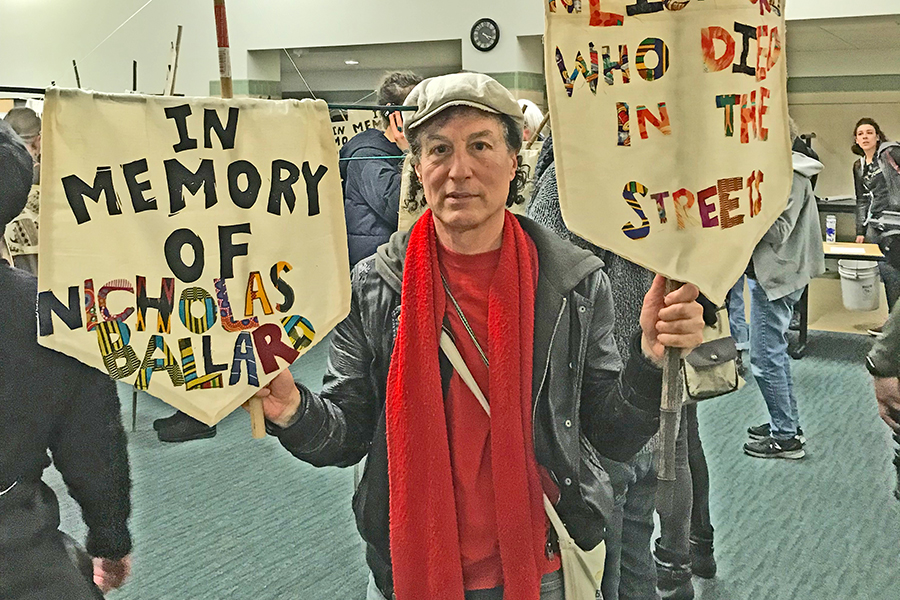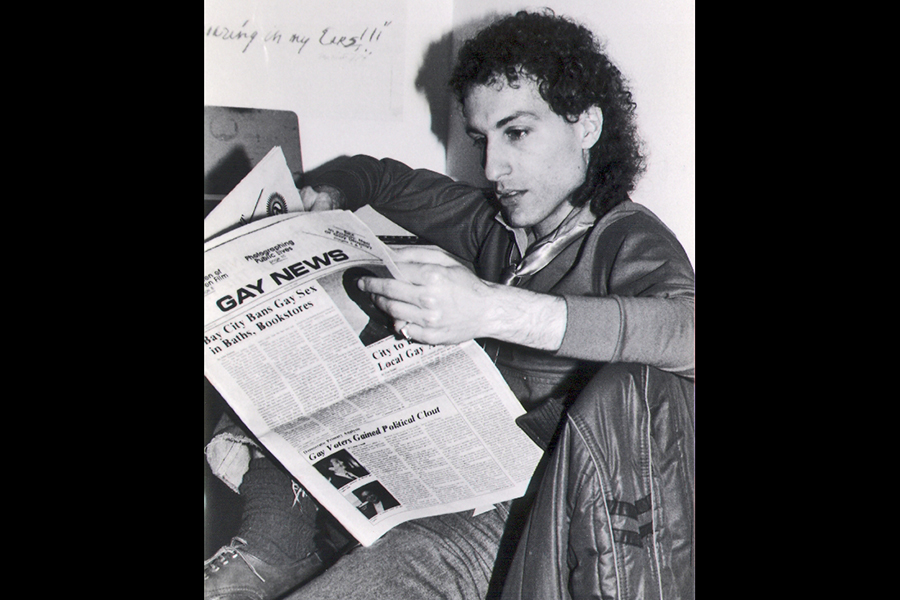For 20 years, Tommi Avicolli Mecca was the face of gay-activist journalism in Philadelphia and a fixture in Philly’s nascent LGBTQ community. “I wanted to be a voice for the voiceless,” he said of his work as a journalist. “I wanted to tell the stories that weren’t being told and amplify the voices that weren’t being heard.”
At 68, Avicolli Mecca is still an activist — working for the most vulnerable in the LGBTQ and other communities — focused on the housing crisis, poverty and homelessness. The road from Stonewall to now has been one of self-discovery for the gender-nonconforming queer writer and artist.
In an interview with PGN from his home in San Francisco, Avicolli Mecca talked about growing up in Philadelphia and his involvement in gay politics in the early days after Stonewall. He was raised in one of the poorest sections of South Philadelphia. As a student at Bishop Neumann High School, he worked on the school paper and organized against the Vietnam War. “I was very rebellious in high school,” Avicolli Mecca said, “I got thrown off the school newspaper because I kept writing about Vietnam.”
Bishop Neumann was a boys’ school and had a rule that a student’s hair couldn’t touch his uniform collar. Avicolli Mecca was regularly pulled into the office to have his hair cut. In a final act of defiance at his graduation ceremony, having grown his bangs long, slicking them back at school, he pulled off his mortarboard, shook his long hair out, accepted his honors awards and refused to kiss the bishop’s ring.
“I flashed a peace sign,” he laughed. “The priest in the front row gave me such a look.”
Avicolli Mecca then attended Temple University as a journalism student where he was equally iconoclastic. He joined the anti-war movement at the college and discovered gay activism when he attended a meeting of the Temple chapter of the Gay Liberation Front (GLF).
“I saw an ad for GLF in the student paper,” he recalled. “I saw this thing about Gay Coffee Hour. That day I went to the student activities building. The meeting was on the second floor, and I remember how long it took to climb those stairs.” Avicolli Mecca recalled that The Supremes were playing when he went into the meeting. “I walked into that room and my life changed forever.”
While Avicolli Mecca continued to be involved in anti-war politics at Temple, he became increasingly aware of the “homophobia of the left,” a contradiction among progressives that he continues to experience even now in San Francisco.

When Avicolli Mecca graduated from Temple, there were already attempts to moderate GLF on campus. “GLF was considered a radical name,” Avicolli Mecca said. “Liberation was a word that was associated with radicalism.” But, he says, the early post-Stonewall movement “was a radical movement.”
Avicolli Mecca, by then a radical fairy who was breaking down gender norms from the streets of South Philly to the Gayborhood, said, “I was living in radical drag,” about his style of dress in the early-to-mid 1970s.
With long curly hair, Italian good looks and a slender frame, Avicolli Mecca often wore women’s tops and makeup. Looking back, he said, “I spent a lot of time feeling vulnerable and scared. It was one of the bravest things I’ve done. Every day I was out there — walking street theater. I could get killed, but I had to do it. I am so happy that I did it. I would never have come to peace with who I am if I hadn’t.”
He added, “I had the freedom to dress any way that I wanted. It was a great journey.
Sometimes I will [still] do drag. I found a masculinity in me that I never knew I had.
I don’t hate it or reject it. I came to peace with who I am. Call me she, call me he, call me they. It was a great journey.”
With Cei Bell, Avicolli Mecca founded Radical Queens. He also co-organized the first gay pride march in Philadelphia in 1972.
After leaving Temple, Avicolli Mecca became president of the newly formed Gay Activists Alliance. He was writing for the weekly alternative newspaper, “The Drummer” and for
early gay newspapers, “The Gay Alternative” and “The Philadelphia Gayzette.” He also wrote poetry and read his work throughout the city in the vibrant 1970s poetry scene. At a reading celebrating a poetry award he won, Avicolli Mecca said, “I did a couple queer poems. [Allen] Ginsberg was probably just coming out of the closet about then.” No one was ready for those queer poems except other LGBTQ people, he explained, and so his career as a poet didn’t surge.
Avicolli Mecca kept at it though and engaged with other well-known gay and lesbian writers of the 1970s in Philadelphia, “Jack Veasey, Barbara Ruth, Julie Blackwoman. I kept doing poetry. I kept doing art. Art is my way of staying sane in an insane world,” he said.
He founded Avalanche, the city’s first multi-racial LGBTQ theater group and also GALA, the Gay and Lesbian Arts Festival.
As an early editor of PGN, Avicolli Mecca said he brought activism to his journalism in ways his college professors had explicitly said could not be done. “When I had the power to hire, I brought in women of color,” he said. He hired Lori Kim and Shilpa Mehta. Kim is Korean-American, Mehta an Indian immigrant.
Avicolli Mecca was also an archivist. The archives at the William Way Center are built on his work: compilations of photographs, newsletters, memorabilia that he carefully maintained over 20 years — all to create a historical record of the early LGBTQ movement.
After a decade at PGN, AIDS finally drove Avicolli Mecca out of Philadelphia. His parents had both died within months of each other in 1990. The daily intensity of covering the AIDS crisis was too emotionally draining. He expected only to take a break, but San Francisco has been home since 1991.
While Avicolli Mecca’s activism shifted gears in San Francisco, it didn’t end. He continued to write poetry, make art and perform. But the housing crisis and consequent LGBTQ homelessness became a focus for him. “All these queer and trans kids were moving to San Francisco.”
He explained that a one-bedroom costs $3,800 a month — $50,000 annually in rent alone. “You’ve got this young person who’s queer or trans. And that person can’t afford to live here. So of course they end up on the streets. I got so angry,” he said.
Soon Avicolli Mecca found himself organizing with an MCC pastor, Jim Mitulski, to find housing for young LGBTQ people in their late teens and early 20s with nowhere to go. “I organized meals, showers, housing. We helped hundreds of people 18 to 25 get their GEDs, get permanent housing.”
He neglects to say “and saved lives,” but it’s apparent. People were being beaten and sexually assaulted while living on the streets or even when in shelters. Avicolli Mecca asked, “Why aren’t we treating the homeless the way we took care of people with AIDS?” he asks. “What happened to ‘we are family’?”
Avicolli Mecca got pushback from gay business people who didn’t want homeless LGBTQ people wandering the neighborhood and driving away trade. After meeting a series of young queer people who had experienced violence in the shelter system, Avicolli Mecca decided, “We’re going to set up a queer shelter.”
And he did. Jazzy’s Place and Marty’s Place were the first.
“That’s the work I’ve been doing. I can’t believe that at the end of my life, I am still doing this,” he said, although when he turned 66 he stopped working full time. “I need some balance in my life. You can’t kill yourself in the fight.” But, he added, “I’m still going to do the work.”
See more of Tommi Avicolli Mecca’s writing and art at http://www.avicollimecca.com.
